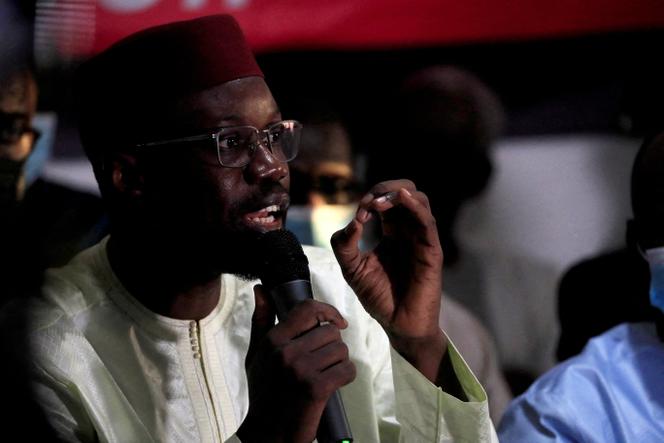


Charges and convictions are piling up, but Ousmane Sonko's lawyers are adamant that there is nothing to prevent the anti-system opponent, who was invested on July 13 by his party Les Patriotes africains du Sénégal pour le travail, l'éthique et la fraternité ("African Patriots of Senegal for Work, Ethics and Fraternity"– PASTEF), from taking part in the February 2024 presidential election. "There will be no elections in this country, or else there will be indescribable chaos if President Macky Sall uses judicial tricks to prevent my candidacy," he warned in an interview with news channel France 24.
But can Sonko really stand for election now that his party has been dissolved and he is in prison? Le Monde attempts to answer this question by reviewing the three legal proceedings pending against Sonko. He is on hunger strike and was hospitalized on Sunday August 6, according to his entourage.
This sentence alone, handed down in May, could have led to Ousmane Sonko's removal from the electoral roll, but his lawyers appealed to the Supreme Court a few days after the ruling. "As the appeal in the Supreme Court is suspensive, his conviction has no effect on his eligibility for the time being," said Yaya Niang, a lecturer and researcher in public law at Gaston-Berger University in Saint-Louis. For Sonko to be struck off the electoral roll, the Court would have to reject the defense's request.
But that is not all. In Senegal, removal from the electoral roll can only take place during the period when the electoral roll is being revised. For the 2024 presidential election, revision ended at the beginning of May. Should the Supreme Court reject Sonko's appeal, the PASTEF leader would have to turn to the Constitutional Council.
That was the case for the former mayor of Dakar, Khalifa Sall, convicted in August 2018 of "forgery and fraud" and "fraud involving public funds." His candidacy for the 2019 presidential election had been invalidated by the Constitutional Council several months after the close of the electoral roll review and ten days after the failure of his appeal. In its decision, the Council found that a sentence "involving his removal from the electoral roll" would render him "electorally incapacitated."
Accused of rape by Adji Sarr, a former employee of the Sweet Beauty massage parlor in Dakar, Ousmane Sonko was found guilty in June of "corruption of youth." He was not present at his trial and therefore cannot appeal this conviction, which could again render him ineligible.
According to the Senegalese criminal procedure code, a conviction can only be "annulled" if the person convicted in absentia is arrested or constitutes himself a prisoner. In that case, the trial must be retried, not in the Court of Appeal, but in the same chamber in which it was heard in the first instance. "A conviction that has been quashed has no effect on eligibility," said researcher Niang.
Sonko was indeed arrested on July 28, and on August 3, he gave notice from prison of his "non-acquiescence to the judgment." But the situation is highly entangled: Public prosecutor, Abdou Karim Diop, considered that the reasons for Sonko's incarceration bear "no relation to the proceedings" linked to the Adji Sarr case. In other words, he cannot be tried again.
"The public prosecutor has put us in an incomprehensible situation. How can a person be detained and still be considered to be in absentia?" asked El Amath Thiam, a specialist in business litigation. At a press conference on Monday August 7, Justice Minister Ismaila Madior Fall reiterated that the judgment in the rape trial "has not been executed." Faced with this imbroglio, the question of Sonko's eligibility may once again have to be decided by the constitutional judges when it comes to ruling on candidacies for the presidential election.
After having been arrested and detained in Dakar, the opponent was charged with nine counts, including "calling for insurrection, criminal conspiracy, undermining state security, criminal conspiracy in connection with a terrorist enterprise" and "plotting against state authority". The judicial investigation is still ongoing. Sonko is therefore still presumed innocent of the charges against him, and his eligibility is not in doubt. No trial date has been set in this case. It is therefore unlikely that a judicial decision will be reached before February 2024, date of the presidential election.
Translation of an original article published in French on lemonde.fr; the publisher may only be liable for the French version.
